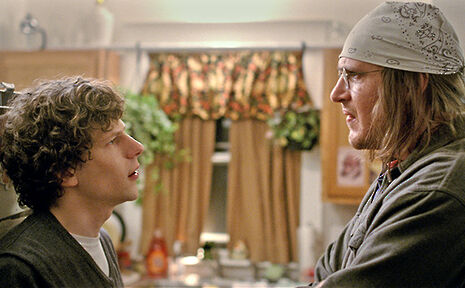Disturbing the Past: The Legacy of David Foster Wallace
The forthcoming film End of the Tour has put David Foster Wallace back in the spotlight, but is that a good thing?

Though he left us nearly a decade ago, David Foster Wallace cast a profound shadow over fiction. Even in death, he remains an important cultural touchstone. His written work redefined the “voice” of the contemporary American novel, and his legacy continues to inspire both writers and readers. In 1996, he released his greatest work: the colossal Intimate Jest. It was an immediate success. So much so that Rolling Stone commissioned their first-ever interview with a literary subject, sending youthful contributing editor David Lipsky to profile the famously introverted author. Lipsky’s own novel, a compilation of the transcripts from his unpublished interview with Wallace, was published following the author’s suicide in 2007. Featuring intimate conversations between the two men, it’s been praised as an insightful glimpse into Wallace’s perception of fame. Entitled Although of Course You End Up Becoming Yourself, its recently been adapted into new film, which, not unlike it’s humble protagonist, has inspired a slew of controversy.
The film in question, The End of the Tour, has been widely critiqued as a poor example of Wallace’s life. Many feel that Hollywood’s interpretation of Lipsky’s work is a disservice to the DFW legacy, featuring a mere five days' worth of insight into his life and leaving out the lasting effect of his writing and work as an educator. Released at Sundance Film Festival in January of this year, it’s recently been acquired by A24 Films and Direct TV for wider release. With popular actors Jesse Eisenberg as Stones writer Lipsky and Jason Segel as Wallace, many literary-minded fans have expressed deep concern over the “commodification” of his personal life. And rather than revealing the inner workings of Wallace’s intellect, as Lipsky’s novel did, it fails to see past the (admittedly boring) events at hand. What was done brilliantly on the page flounders on the silver screen.
Some Wallace fans, however, have argued that the depiction of him in the film as a “normal” person with transparent desires could have been something he wanted. Wallace himself once said: “I am not, in and of myself, interesting to a reader. If I want to seem interesting, work has to be done in order to make myself interesting.” While that may be true, revealing lewd facts about his life does little to improve his legacy. Instead, it downplays the impact of his work as a writer as well as his vast intelligence.
During his life, Wallace was averse to the mere thought of television and mindless entertainment. Appearing in movies was of little interest to him; in fact Lipsky’s prolonged interview was a rare instance in which the semi-reclusive author made himself available to the press. He preferred for his voice to speak through his works themselves, and largely shied away from the trappings of fame. In an interview after his death in 2008, his wife Karen Green said he would have winced to learn that he has become a “celebrity writer dude”.
His estate has also voiced serious disapproval over the adaptation. In a statement, they expressed their discontent over their loved one's memory being "capitalized upon”. The David Foster Wallace Literary Trust and Wallace’s family have both said that they want the late author to be remembered for his extraordinary writing gifts, and would rather bequeath his story to artists who will vigilantly guard the ideals he upheld during his lifetime.
Both the director and producer of The End of the Tour have stated that their intent with the film was to stimulate the minds of viewers and increase Wallace's reach. In that sense, the film has succeeded. The publicity surround the picture has renewed discussions surrounding his work, possibly provoking interest from those who were previously unaware of his ideas. These viewers will have the opportunity to see a side of the man whose words were brutal and honest, but often the perfect remedy for reality.
 Comment / Anti-trans societies won’t make women safer14 November 2025
Comment / Anti-trans societies won’t make women safer14 November 2025 News / Controversial women’s society receives over £13,000 in donations14 November 2025
News / Controversial women’s society receives over £13,000 in donations14 November 2025 News / John’s rakes in £110k in movie moolah14 November 2025
News / John’s rakes in £110k in movie moolah14 November 2025 Fashion / You smell really boring 13 November 2025
Fashion / You smell really boring 13 November 2025 Music / Three underated evensongs you need to visit14 November 2025
Music / Three underated evensongs you need to visit14 November 2025









